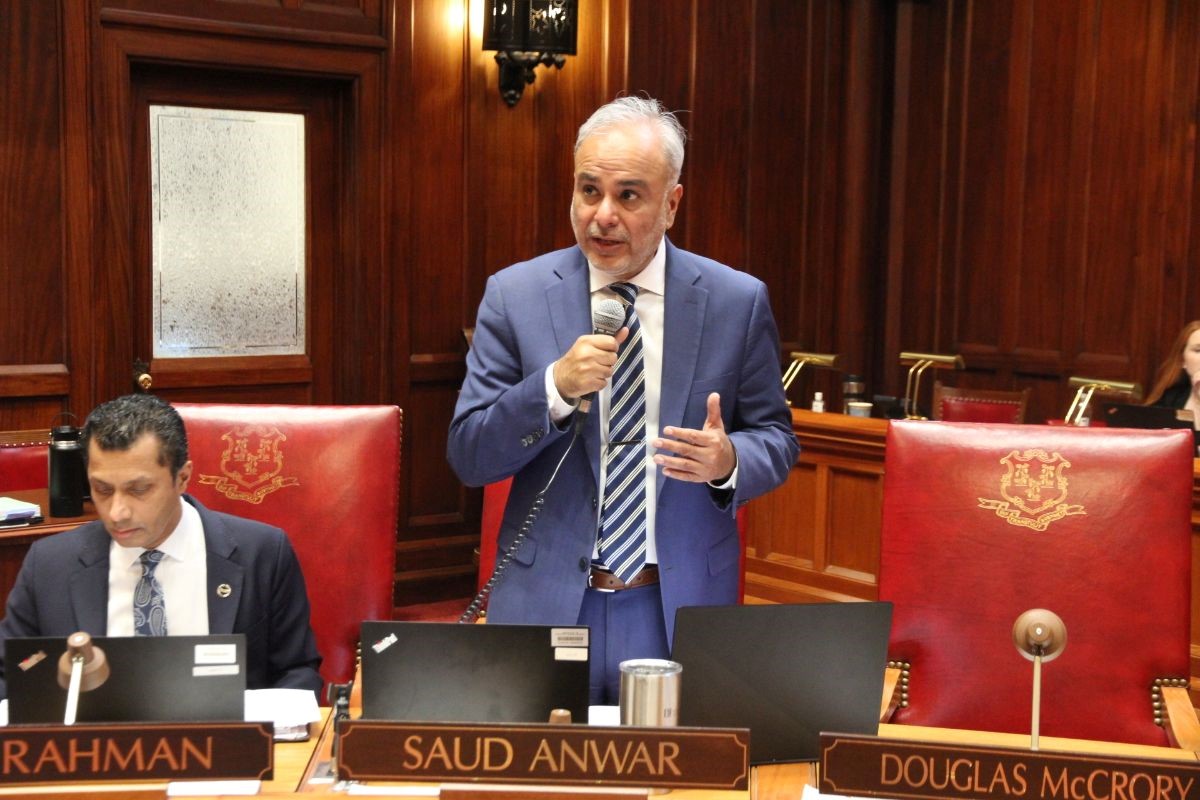
Senator Gaston Supports Emergency Legislation Including Funding for Special Education
Today, state senator Herron Keyon Gaston (D-Bridgeport) voted in support on a wide range of priorities including $40 million to help municipalities cover the cost of special education, policies governing how schools interact with federal immigration officials, and grants for nonprofit organizations.
“Today, I am proud to cast my vote in support of a comprehensive bill that addresses several critical priorities for our state,” said Sen. Gaston. “The $40 million investment in special education will provide essential resources to municipalities, ensuring that all students have access to the education they deserve. Additionally, the bill strengthens policies to protect our students’ rights when interacting with federal immigration officials, creating a safer and more supportive environment for every child. By empowering school administrators to effectively handle potential encounters with federal immigration officials, we are ensuring that our schools remain safe, welcoming, and focused on providing a quality education to every child. Finally, by supporting grants for nonprofit organizations, we are empowering our communities to continue their important work. This bill reflects our commitment to equity, education, and community well-being across Connecticut.”
Funding to Help Connecticut Municipalities Provide Special Education Services
This funding is in addition to the $181 million which was previously appropriated for Fiscal Year 2025 bringing the total to $221 million.
The funding will be allocated through the Excess Cost Grant program and distributed to municipalities through a tiered reimbursement structure that prioritizes funding for the neediest cities and towns.
Connecticut has made consistent and deliberate strides to increase its support of education over the last several years. State budgets adopted by the General Assembly have boosted funding for education by a total of $364 million since fiscal year 2023. The legislature supplemented this support with an additional $150 million dedicated to Education Cost Sharing Grants.
One of the ways in which Connecticut provides financial assistance to towns and cities for special education services is through the Excess Cost Grant program. This program is designed to offset significant expenses associated with educating certain students with special needs.
In 2022, the legislature amended the Excess Cost Grant program to create a tiered reimbursement structure to ensure that the state’s poorest municipalities were given funding priority. Meanwhile, state budgets have increased funding for the grants by $50 million over the last two fiscal years.
However, these efforts have not been enough to keep pace with significant increases in the need for additional special education funding experienced by Connecticut towns and cities. From fiscal year 2022 to fiscal year 2023, the estimated cost of fully funding the Excess Cost Sharing Grant program surged from $175.7 million to $203.8 million. That number climbed to $260 million in fiscal year 2024 and is estimated to be $289.3 million in 2025.
There are calls for more funding in addition to this immediate allocation. Budget deliberations are ongoing, and it is likely that the conversation surrounding special education funding will continue over the next several months. Senate Democrats have unveiled Senate Bill 1, An Act Increasing Resources for Students, Schools, and Special Education, and the House Democrats introduced House Bill 5001, An Act Concerning the Quality and Delivery of Special Education Services in Connecticut. Both pieces of legislation aim to reform Connecticut’s special education to lower costs, strengthen services, and provide more financial support.
Guidance on School Interactions with Federal Immigration Officials
The legislation contains new language designed to make it easier for local school boards to question federal Immigration and Customs Enforcement (ICE) agents if they seek to enter a public school looking for information about potentially undocumented students.
While there have been no known cases of federal ICE agents attempting to enter a Connecticut public school so far this year, this new language seeks to strengthen a school board’s ability to handle such a situation.
Section 1 of HB 7066:
Requires, by April 1, that each school have an administrator appointed to interact with federal immigration authorities.
Requires each school district’s school safety and security plan be amended in a manner consistent with the state Department of Education (SDE) guidance issued on January 28 that protects constitutional rights of all people in schools.
Prohibits discipline of a school employee who acts consistent with that SDE guidance.
HB 7066 is a complement to Gov. Ned Lamont’s Executive Branch action taken late last month. One week after President Trump was sworn into office on Jan. 20, Governor Lamont and SDE Commissioner Charlene Russell-Tucker issued guidance to every K-12 public school in Connecticut regarding the protection of students in the classroom when it comes to federal immigration enforcement activities.
Both Connecticut and federal law protect a student’s right to attend public school, regardless of their immigration status. The SDE guidance provides school personnel with a detailed framework for developing policies and procedures that protect student rights, consistent with state and federal law.
That SDE guidance suggests school personnel:
Request and record an immigration agents’ identification, including their name, badge or ID number, telephone number and business card.
Direct immigration agents to a designated school official if the agent requests access to records, information, non-public areas of a school, or a member of the school community.
Ask the agent if they have a judicial warrant to support their request and, if so, to produce such warrant.
Review any warrant or other materials produced to determine what it authorizes the agent to do and who issued it. Some immigration agents may have “administrative warrants” or orders that are not court orders issued by a United States district judge or magistrate; such administrative warrants may not authorize agents to access materials or enter areas where access is restricted to the public.
Consult with the school district’s legal counsel — or any guidance provided by legal counsel — on how to proceed depending on the nature of a request; whether a warrant is produced; the details of a warrant; the judicial or administrative nature of any such warrant; whether an immigration agent claims exigent circumstances; and any other considerations identified by legal counsel.
Grants for Nonprofit Organizations
The bill also appropriates $2.88 million to 23 different organizations that address children’s, immigrant, Jewish, women’s health, neighborhood, LBGTQ, and other issues, including:
$800,000 for Planned Parenthood of Southern New England
$387,500 for the Hartford Gay and Lesbian Health Collective
$225,000 for the New Haven Gay and Lesbian Community Center
$225,000 for Integrated Refugee & Immigrant Services
Another $62,500 was appropriated to each of the following organizations:
Connecticut Institute for Refugees and Immigrants
Jewish Family Services of Greenwich
Connecticut Immigrant and Refugee Coalition
Center for Children’s Advocacy
Anchor Health Initiative Corp.
Middlesex Hospital
Triangle Community Center
Queer Youth Program of Connecticut
Kids in Crisis
OutCT
Bridgeport Pride Center
PFLAG Enfield
PEERPRIDE
The World Health Clinicians
Social & Environmental Entrepreneurs
Upper Albany Neighborhood Collaborative
City Seed
Building One Community Corp.
Havenly
Junta For Progressive Action









